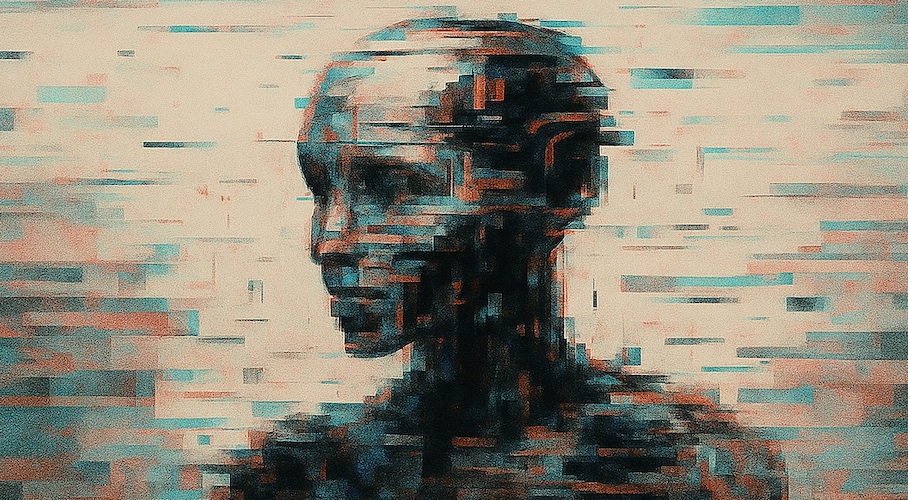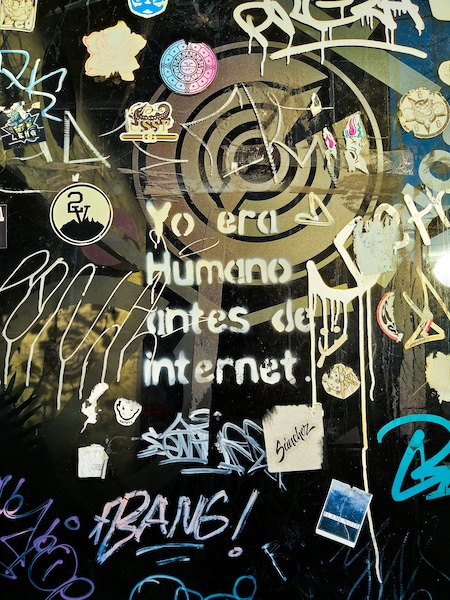
The universe does not allow perfection
Stephen Hawking
Everything in Communication has a story. The bigger picture and background any item or fact belongs to. Products are connected to brands, campaigns belong to a strategy, protagonists belong to a story,. Their own and the ones they are involved in. Our entire being is part of something bigger. If we try to picture it, we build a concept. Our life is a concept broken down in sub-concepts. Still, there is always the bigger story, the one generic context holding all connections together
Enter AI. The big revolution changing our lives forever. First of all, as a GenX dude I can tell you (using a grandpa-voice) from the bottom of my heart that I’ve heard this before. When computers became useful and not limited to nerds. When Photoshop made us all photographers and Adobe gave us layout power.
When digital recording entered the studio and we did not have to play songs ten times over until we got everything right. And of course when suddenly information popped up via Internet, coms became gloabl and soon portable. On mobile phones that soon made my first Apple Classic look like a Lada.
Has it changed humanity? Hell, yes. Has it changed our perception of quality? On the surface, yes. But then not as much as people think. In any case, many graphic designers, photographers and studio musicians have lost their jobs or didn’t even start their dream career. And understandably so if one has to compete with machines that don’t need to get paid to live. And to hell with quality.

Higher, faster, farther
That is again the big promise and indeed it has again made production cheaper and given customers more power. But then it also – again – compromised quality because far too many people without training or knowledge became capable of production overnight. If DTP already was a low-punch for quality back then, today we are confronted with a technology that literally does everything. On a lower level without anyone having to control it with functions, scripts and commands. All we have to do is express a wish and the result appears as if by magic. That’s the promise on the packaging.
Don’t get me wrong: I use AI myself. Just as I have learned and used Photoshop, Quark XPress, ProTools and LogicPro. And I am having a lot of fun with AI. The new astonishing tools and image editing functions in Photoshop being one example. Speaking of which, caution, modesty and honesty towards oneself is key here. I have at least learned the craft to the extent that I know what I can do and what the machine can do. Most importantly, I know what we can’t do together and when I need to call in a professional. I can use AI for all simple, everyday business tasks up to strategic planning. I design prompts to get good information, structures or mood boards. I use frames, feed them with questions and information, and in a matter of seconds I can do a lot of work that otherwise would take me days. But can I trust it? No. Whatever comes back is reviewed and not released into the world with a quick swish.
It doesn’t think. We do. actually..
First of all, it is important to understand that AI is not very I yet, truly intelligent. In fact, it’s more C as it copies, collects and weighs up information. Sure, it is certainly running on countless filters, routines, logic or even deep coding and programming. Then it delivers or designs whatever you are looking for. Or so you think. Let’s not kid ourselves: AI reproduces existing content that it has found, and it doesn’t even do that particularly well. It is neither innovative nor does it deliver good quality – unless you have the basic knowledge or the money to run expensive tools, employ an Armada of coders who develop and manage high-velocity rendering processes.
So let’s be honest with ourselves: we have been dealing with AI for quite some time, albeit under a different label. Journalist Carole Cadwalladr uncovered this at the time by revealing what Cambridge Analytics was doing in the political process in the UK and the US. Collecting data, creating algorithms and political content, then hammering it into people’s timelines. For this, she was sued and subjected to an incredible shit-storm from tech oligarchs to political lobbies.
Intelligence devours its children
Again: Collecting Information, creating content, mass-communicating. Sound familiar? That is what AI does. And more: We seem to resignedly accept the fact that Twitter is now a bot-infested propaganda tool where political agendas, mis-information, defamation and agitation are the News people digest. Worse, they consume it like fast food and make decisions based on it. Meanwhile, the information rebels among us are trying to figure out whether they are arguing with paid demagogues or bots. The latter have not only taken over X, but have also entered chat rooms. There they discuss and argue not only for political parties, but also for brands and products. Bots. Telling you to change your consumer taste.
This is the true information age: machines having access to all data (which is why Musk is spending such an outrageous amount of money on a twat like Donald Trump). Carole Cadwalladr calls it a repressive engine in a state that will ultimately become – or already is – a techno-authoritarian surveillance state. These days, the US is screening Facebook accounts to determine whether foreign applicants pass the MAGA test, which grants access to American universities. Peter Thiel’s Palantir does this and much more with the data collected by DOGE.
The situation is hardly any better on scientific levels. This raises an essential question: From whom should artificial intelligence actually learn from? AI constantly produces new content that is to a large degree initiated by poor prompts and based on unverified or false information. In doing so, however, it pollutes its own biotope and gene pool. Or rather. it descends to digital cannibalism developing a form digital BSE. At the dawn of the new millennium it was only discovered later that cattle should better not be fed their own corpse parts processed into super-protein. Really not being polemical here: what can intelligence actually learn if the material isn’t intelligent but self-produced? And what is supposed to come of it?
Dudley Lynch and Paul Cordis in their book Dolphin Strategies ask what comes after constant innovation (which can be imagined as an ever-increasing frequency of sine wave amplitudes). Their theory: the return of inventions. That is indeed happening in music, which at some point became innovatively exhausted. Today’s charts already consist largely of borrowed compositional elements. Similar situation in fashion. And now dissertations.
Is that art or can we trash it?
So then, what kind of innovation can AI deliver if it isn’t even intelligent? Should it even be expected to? Or is the real data reserved for the Lamborghinis among AI computers, their coders and investors, while the rank and file lower class inhale recycled data waste in some kind of AI McDonald’s? A scenario that, judging from what we see on X is frighteningly real. And so t is not religion but AI that is the opium for the common people. Add to that South African Mars explorer and amateur anthropologist Elon Musk, who threatened in one of his X announcements wanting to completely rewrite history using X-AI. An intelligent reworking of our human and cultural history. Redefined by the very techno-oligarchs who, in this brave new world and together with their political patrons, decide what is art or culture, what is politically expedient and what is not. In this context, we no longer even want to talk about true and false.
Until then, we devote ourselves to the daily AI hysteria, especially in the world of digital work. GPT prompt & frame charts for digital jobs and job searches are now being posted on LinkedIn with a frequency worthy of RTB heavy spending. On X, the American president already has a historic title ready for a war before it even ended. That is the digital age. History is being written while it happens. The wet dream of any propaganda expert.
There is no more deliberation in development. Instead there are solutions to problems that haven’t even been explored. And that is the real problem: we no longer think for ourselves; others think for us. Entrepreneur Mikael Pawlo sums up this situation in sombre terms: this new version of the Internet will no longer be open. It will be personalised, predictable and closed. The Internet of the future will no longer be searchable. You won’t go there anymore – it will come to you. Summarised, evaluated, commented on and tailored to your personal preferences. And, more and more often before you even ask for it.
The Internet is dead, long live the Internet
Back to AI for the layman. Yes, AI-driven techniques are getting better and better, no question. Nevertheless, I still need to be a trained designer, photographer or producer to recognise where AI creations become boring or downright wrong. To intervene and apply common sense, human knowledge or simply humanity.
Berlin based advertising agency Jung von Matt Spree have created Germany’s first completely AI-generated advertising campaign for the beverage brand Spreequell with ‘Trink dir Berlin bergig’ (Drink Berlin mountainous). This brightly coloured commercial features scenes such as the Berlin TV tower in an Alpine panorama and the Berlin underground racing through mountainous landscapes. In this surreal pop art design, which would be prohibitively expensive to produce using traditional methods, the visual content, voice-over and voice actors were all created using generative artificial intelligence.
We are being bombarded with artificial creations that look and sound anything but natural. On top of that, we digest information that has not only been compiled, but is often invented. By idiots who post it on the Internet and an AI that does not recognise or check it. Or has generated it itself, just like you would programme a bot. Here, too, there are apparently the same price and quality differences as with chat and service bots.
Speaking of which, from now on we’re not only discussing complete automation of creative services, but also government services. That’s right: advice, assistance, decision-making, social services and health-care. With that degree of inhumanity, insensitivity and obvious lack of depth and realism? You have to be kidding. Or not.
So let’s return to Ms Cadwalladr and her view of the political and social hype surrounding AI: it’s bullshit. It’s not inevitable – and we can stop it. If we trust our senses. Okay, in an age when people blindly walk into busy roads because they’re staring at their mobile phones, it seems unimaginable. And maybe it is. But what will be the result?
Crisis equals opportunity
We are drowning in a sea of mediocre artificial content. But then, amongst this pile of grey mud we might soon be able to recognise human creations more clearly again. And we can seeek, find and enjoy handmade quality. Just like we eat while the kids sit in front of cold plates as sharing their wow-dinner with the world tops eating it. Or listen to artificial dance loops sweetened with copied melodies from the 80s and 90s because neither producers nor the AI thing are capable of composing an innovative chart hit.
So, am I against AI? Not in the slightest. I use it and think it’s cool. I have the thing research or apply a strategic frame to my detalied prompt, then correct and fine-tune the outcome. Just like I enjoy playing drums to sound bites and using them to play and produce myself. Exactly: playing. Drum-loops can be programmed. But you can easily make them groove by playing them yourself. Yes, it’s possible. It’s work. It’s a craft.
What I detest to the core is the constant fanatical hype surrounding techno-gurus. It’s as if tomorrow will be a future without a past. Add to that the excited predictions of machines soon taking over and Cyberdyne will rule the planet with its Terminator brigade. Again: nonsense. Machines need supervising operators, software production needs experts applying finishing techniques and craftsmanship they learned. That is how humanity has developed and how things have improved – through innovation, not reproduction. As I said before, the thing can’t think. Not yet, not by a long shot.
AI is a wonderful thing for saving time, at least initially. However, it doesn’t lead us anywhere in terms of creativity. Except for artificial-looking images or texts sounding as if your tax advisor wrote your CV. AI is a tool. It’s the means, but not the answer and definitely not the goal. GPT fans can boast all they want about intelligent automation. The fact remains that nothing can or will replace the human brain in the foreseeable time. More precisely, emotions and emotional decisions. The gut-feeling.
That is why we talk about robotics in automation. Everything else is nonsense.
I think, therefore I am
Taking the term Homo Sapiens seriously we are built to learn techniques and craftsmanship, and we should continue to do so. After all, the final quality is determined by our personal interpretation, experience and decision as to which technique is used when and how. Or not. This is because, at work as in life (and in the kitchen), we make many decisions based on gut feeling. These decisions are actually our mind in conjunction with our spirit, using techniques and experiences for solutions and, most importantly, ideas and innovation. It remains a fact that brain research has not yet come close to deciphering how and why the brain functions so brilliantly. This should put the ramblings of the oligarchs and their disciples into perspective.
What we perceive as quality is a product, a service or communication coming from another human we like, connect to and eventually trust. It is the human factor in our perception we relate to and build a relationship upon. Even if that relationship is sheer consumption. But even that one is somewhat a cogbnitive action and we tie decisions to it.
Reputation? Yes – from other people. Appearance? Yes – designed by people. Quality? Definitely – made by people. Or to put it another way: if you compare a cake from a factory with the masterpiece baked by your mother or grandmother the choice is clear. We all want real ingredients and handmade quality we can trust. Made by people we trust. People who use their minds, their hands and their tools. People. Not machines. We used to call it homemade. Soon we’ll call it human-made.
Incidentally, Caroline Cadwalladr lost her lawsuit against the data giants. Big time.
Share
Latest Posts
July 1, 2025
July 1, 2025
July 1, 2025



